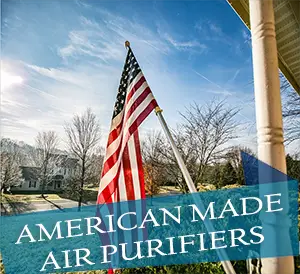Introduction
Most of us know that air purifiers work to clean the air, but exactly, how does an air purifier work? Air purifiers are greatly beneficial to homes with allergens, pet dander, pollen, pollution, smoke, and the like. This article will cover the mystery behind the technologies used in an air purifier.
How quickly does an air purifier work?
For this fact, you need to look at the speed of which an air purifier works. The speed is measured usually in CFM or its air consumption, which goes a little something like this (use this as a guide for choosing an appropriate air purifier for your room, whether it’s small, medium or large-sized):
|
CFM |
Light use (small homes)
Cleaning every 15 minutes |
Moderate use (large homes)
Cleaning every 7.5 minutes |
Heavy use (hospitals and commercial use)
Cleaning every 2.4 minutes |
|---|---|---|---|
| The volume of air (cubic feet) | |||
| 100 | 1,500 | 750 | 240 |
| 200 | 3,000 | 1,500 | 480 |
| 300 | 4,500 | 2,250 | 720 |
| 400 | 6,000 | 3,000 | 960 |
| 500 | 7,500 | 3,750 | 1,200 |
| 600 | 9,000 | 4,500 | 1,440 |
| 700 | 10,500 | 5,250 | 1,680 |
CFM is the air consumption, which is the rating of a specific air purifier. The volume of air is the amount of air that the air purifier can take and clean up, based on its CFM. These can vary depending on the amount of pollution (light, moderate, or heavy use).
Look for the volume of air depending on your intended usage while matching it with the unit’s CFM. Since you will be cleaning more often with moderate use and heavy use, the volume of air tends to decrease.
Are room air purifiers effective?
Generally, yes! However, do note that the effectiveness of an air purifier depends on the filter type, which is the following:
- HEPA filters – also known as high-efficiency particulate air filters, they remove 99.97% of particles in the air.
- Carbon filters – they are ideal for removing odor, smoke from tobacco, smoke from cooking, VOCs from paint and construction materials, and even pet and kitchen odors.
- Pre-filters – these are ideal for trapping larger particles in the air, such as pet dander, dust, and the like. They are usually part of a multi-layer filtering system.
Do air purifiers really work?
Yes and no – it largely depends on how you use it. For instance, what’s the point of using an air purifier if you don’t stop the source of smoke? How is an air purifier going to clean the air if your house is constantly bombarded with pollution all the time? Here are things that you can do to lessen your air purifier’s stress and for it to really work:
- Groom and bathe your pets more often
- Ask smokers to smoke outside
- Cook less smelly foods (or cook them outside)
- Clean your house on a regular basis
- Close windows that may expose your house to pollution
What are the benefits of an air purifier?
Air purifiers are greatly beneficial to the following:
- Allergy sufferers. With an air purifier, they can breathe easily because the likelihood of dust and pollen in the air is removed by its technology, leading to less frequency of hay fever or allergic rhinitis, especially during the spring season.
- Pet owners. A pet owner who uses an air purifier, alongside proper cleaning and grooming, can help eliminate pet dander in the air, which can lessen allergens for people with the sneezes.
- Homes/offices with frequent guests. Your home will become more presentable to fellow guests because your indoor air will be cleaner from pollution. If you have smokers in the house, that’s also a plus point.
- People living in highly polluted areas. Do you live near a factory or is it just plain old smoky in the air because of too much traffic? Air purifiers can be your best friend for that.
- Places with frequent smokers. If you or someone in the house is a frequent smoker (or you often get a visitor who smokes tobacco), air purifiers can clean up smoke odors – just look for a unit that has a carbon filter to eliminate that.
- Hospitals. Air purifiers are tremendously important for sanitation in the hospital because so many viruses and bacteria can be lurking around due to the number of sick patients inside. Air purifiers do its job the most inside an operating room and an ICU to make sure the patient stays sterile and germ-free. In fact, it may also work in isolation rooms for some patients who have special conditions that require them to not get exposed to germs.
- Restaurants and fast food. You need to be clean and safe from germs when you maintain a restaurant or fast food chain. As they say, “clean as you go”, and that also includes your kitchen air. Food often gets mixed together inside a busy kitchen, so why not freshen it up with an air purifier?
How often should I run air purifier?
In most cases, you need to run your air purifier all day and all night. However, this largely depends on your indoor air quality. If you see that your indoor air doesn’t really have a lot of pollution at the moment, you can turn it off. However, continuous operation is more recommended if you really have a serious pollution problem in your home or indoor space.
Is it OK to leave air purifier on all night?
Yes! Many people leave their air purifier to work overnight so that the next day, they feel fresh and bright with the purified air. After all, air purifiers nowadays are quiet and are meant to work while you sleep – they usually have low decibels and have whisper mode to make sure it’s not going to get in the way of your nap or snooze time.
Conclusion
Air purifiers are really awesome to have at home, but are more ideal if you have a dirty indoor air because you live in an urban landscape, or if you have pets, cook fish often, or have smokers around the house. We hope this article gave you some insights on how air purifiers work!




